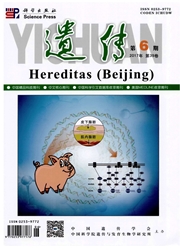

 中文摘要:
中文摘要:
磷脂酰丝氨酸(Phosphatidylserine,PS)是细胞质膜重要的磷脂成分之一,具有重要的生物学功能。在细胞凋亡及一些特殊的病理条件下,细胞内ATP供能不足,胞浆Ca^2+浓度升高,引起PS发生外翻。PS外翻在不同类型细胞中具有不同的生物学功能,且外翻的程度与疾病发展程度密切相关,可作为癌症等多种疾病治疗的靶标。文章综述了细胞质膜中磷脂酰丝氨酸的重要生物学功能和意义、磷脂酰丝氨酸外翻的分子机制及在临床医学方面的应用,以期对未来的功能和临床应用研究提供参考。
 英文摘要:
英文摘要:
Phosphatidylserine (PS), one important phospholipid of cell membranes, has crucial biological functions Under special pathological circumstances such as cell apoptosis, cells cannot generate enough ATP for energy and the concentration of cytoplasmic Ca^2+ increases, resulting in PS eversion. PS eversion has different biological functions in different cell types. In addition, the degree of eversion is closely associated with the progress of diseases. Therefore, it can be therapeutic targets of cancer and many other diseases. In this review, we summarize the fundamental biological functions of PS, molecular mechanisms of PS eversion, as well as its potential in translational medicine.
 同期刊论文项目
同期刊论文项目
 同项目期刊论文
同项目期刊论文
 Identification and characterization of a novel IkappaB-epsilon-like gene from lamprey (Lampetra japo
Identification and characterization of a novel IkappaB-epsilon-like gene from lamprey (Lampetra japo Identification and characterization of a novel IκB-?-like gene from Lamprey (Lampetra japonica) with
Identification and characterization of a novel IκB-?-like gene from Lamprey (Lampetra japonica) with Cell secretion from the adult lampreysupraneural body tissues possesses cytocidal activity against t
Cell secretion from the adult lampreysupraneural body tissues possesses cytocidal activity against t A novel member of lymphocyte-specific protein tyrosine kinase protein identified in lamprey, Lampetr
A novel member of lymphocyte-specific protein tyrosine kinase protein identified in lamprey, Lampetr Cloning and expression analysis of a novel high - mobility group box 2 homologue from Lampetra japon
Cloning and expression analysis of a novel high - mobility group box 2 homologue from Lampetra japon High-mobility-group family genes from Lampetra japonica reveal their early origin and molecular evol
High-mobility-group family genes from Lampetra japonica reveal their early origin and molecular evol 期刊信息
期刊信息
